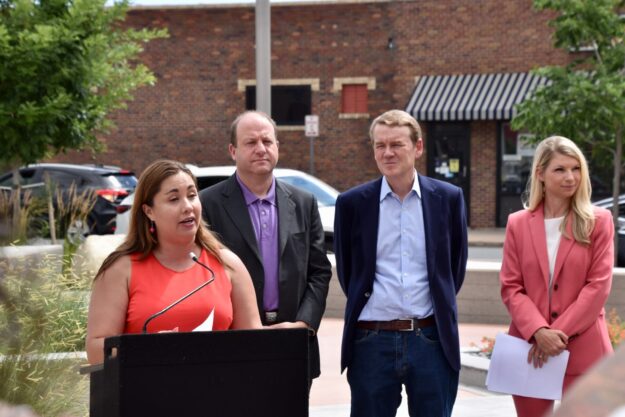Widgetized Section
Go to Admin » Appearance » Widgets » and move Gabfire Widget: Social into that MastheadOverlay zone
Dems laud Colorado climate progress, renewable investment ahead of IRA one-year anniversary

U.S. Rep. Yadira Caraveo, of Thornton, speaks at a press conference marking the one-year anniversary of the Inflation Reduction Act, alongside, from left, Gov. Jared Polis, Sen. Michael Bennet and Rep. Brittany Pettersen. (Chase Woodruff/Colorado Newsline)
Some of Colorado’s top Democratic elected officials stopped in Brighton on Wednesday to celebrate the upcoming anniversary of President Joe Biden’s signature climate law.
A year ago this month, Biden signed into law the Inflation Reduction Act, which included $369 billion in new spending aimed at incentivizing clean energy and speeding the transition away from fossil fuels. It was, U.S. Sen. Michael Bennet told a small crowd in Brighton, “the most significant climate legislation that any country has passed on this planet.”
“Because we passed that bill one year ago, the United States is better positioned than any other country in the world to lead the global transition on energy,” Bennet said. “And Colorado is better than any other state in America to lead that transition.”
Bennet and his fellow Democrats celebrated the announcement earlier this summer that solar panel manufacturer VSK Energy plans to invest $250 million in a new plant in Brighton. VSK chairman Sriram Das cited the Inflation Reduction Act and its tax credits for domestically manufactured clean energy as a key factor in the company’s decision.
The solar plant is expected to begin production next year and create nearly 1,000 jobs locally, which would come in addition to the 300 jobs state officials expect from a large new lithium-ion factory also planned in Brighton by Amprius Technologies, slated to open in 2025.
“After years of federal disinvestment and neglect in many of our communities, in just one year, we’re already seeing these investments start to come back,” said U.S. Rep. Yadira Caraveo, a first-term Democrat who represents the area, which lies in Colorado’s newly created 8th Congressional District. “Brighton is poised to lead Colorado in clean energy manufacturing, and will stand as an example of how this needed investment in our communities benefit families and the future of our local economy.”
In addition to incentives for wind and solar technology to generate clean electricity, the Inflation Reduction Act established a new tax rebate of up to $7,500 for electric vehicles, along with a variety of grant programs to boost home energy efficiency and the electrification of home heating systems.
Gov. Jared Polis, who has made 100% renewable electricity generation by 2040 one of his administration’s signature goals, touted the state’s efforts to build on the IRA’s incentives, including a supplementary state-level EV credit and a new e-bike rebate.
“We’re very ambitious about our clean energy goals in Colorado, and we’re able to get there because of the Inflation Reduction Act,” he said Wednesday. “We also asked ourselves how, as a state, can we leverage this, and augment this, and supplement this to make it even better for Colorado.”
Uncertain emissions cuts
In recent years, scientists with the U.N.’s Intergovernmental Panel on Climate Change have issued an increasingly urgent warning to world leaders: In order to avert the most catastrophic consequences of global warming, they say, governments must cut global greenhouse gas emissions roughly in half by 2030, and achieve net-zero emissions by midcentury.
Those targets have been enshrined into Colorado law by Democrats in the state Legislature — though Polis. who has long favored a more hands-off, market-based approach to the energy transition, has fought efforts by many in his party to enact stricter mandates on polluters.
Democrats and clean-energy advocates last year hailed the IRA — a compromise bill that was scaled down to win the support of conservative Democratic Sen. Joe Manchin of West Virginia — as a historic victory in the battle against climate change.
But one year on, the scale and speed of the law’s impacts on emissions over the next decade remains highly uncertain, independent analysts say.
A report released last month by the Rhodium Group, an influential energy think tank, concluded that even with the IRA, the U.S. is likely to fall significantly short of Biden’s goal of a 50% to 52% overall emissions cut by 2030. Depending on a wide range of economic variables, the group projects that current federal law will achieve emissions reductions of between 29% and 42% by that date — though actions taken at the state and local level could push that figure higher.
“While critical, these federal regulatory policies will need to be paired with ambitious state actions,” the report’s authors wrote. “The IRA is the most substantial federal action the U.S. has ever taken to combat climate change, but it was not intended to solve every decarbonization challenge in one bill.”
Both Caraveo and fellow first-term Rep. Brittany Pettersen, a Lakewood Democrat, were members of the Colorado General Assembly when Democratic majorities enacted the state’s landmark climate-action law in 2019. Pettersen spoke at Wednesday’s press conference with her three-year-old son, Davis, whom she said was “my motivator every day to fight to address this issue.”
“We know what’s at stake with the climate crisis, especially here in Colorado, as you can feel the impacts of climate change everyday,” Pettersen said. “We have a lot more work to do, but I can go to sleep at night knowing these investments and these changes are happening now.”
Editor’s note: This story first appeared on Colorado Newsline, which is part of States Newsroom, a network of news bureaus supported by grants and a coalition of donors as a 501c(3) public charity. Colorado Newsline maintains editorial independence. Contact Editor Quentin Young for questions: info@coloradonewsline.com. Follow Colorado Newsline on Facebook and Twitter.


